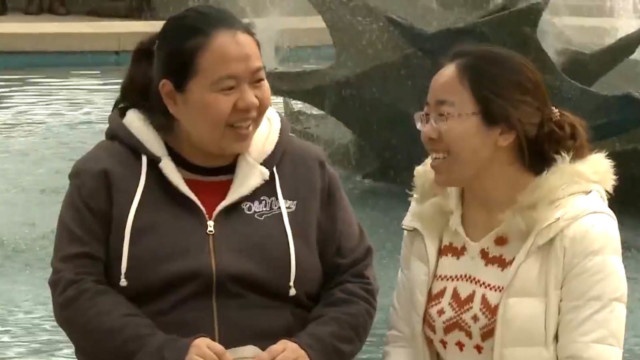Data from the Chinese Ministry of Education shows that in 2015 the number of Chinese students heading overseas to study rose 14 percent. But at the same time, the number of Chinese students who decided to return back home to China after their studies also went up 12 percent.
CGTN’s Mark Niu reports.

At one of the most prestigious and vibrant campuses in the United States, the University of California Berkeley, Chinese students take on a very American activity. Members of the Chinese Student Association are working to promote Chinese culture on campus.
Sophomore Julia Cao says she feels comfortable in the U.S. and plans to stay here for some time, possibly earning a Master’s degree and gaining more work experience. But for most of her friends, it’s a different story.
“Most of my Chinese friends are eventually going back to China. A lot of especially Chinese students, they are still more culturally involved with Chinese stuff. And they are not really used to the things here,” Julia Cao said.
Another factor weighing heavily on the minds of Chinese students is how they see themselves fitting into the U.S. workplace. Even though job opportunities may be good, that’s no guarantee of advancement or the chance to lead.
Economics major Robert Zhang says in many U.S. companies including in Silicon Valley, Asians hit a ceiling.
“Asians, despite being a large percentage of the workforce are represented disproportionately in leadership roles of those companies. On the prospect of returning to China, I would say those of us who have received higher education in the U.S. hold an advantage. We are considered to be free thinkers, to be able to bring advanced expertise to the Chinese workforce and going to be more treasured,” Robert Zhang said.
Kevin Wang, who recently became a naturalized U.S. citizen, has hopes of working in China.
“This is an emerging opportunity for a lot of international students or Chinese Americans who are seeking to use their bi-cultural background to their advantage to kind of travel between the two countries and see what kind of connections they can come up with,” Kevin Wang said.
An hour’s drive away at world-renowned Stanford University, electrical engineering student Yinghao Xu wants to continue his studies for about five more years here, before returning to China.
“I share the same culture with people there. And I find I can truly release my potential working China, but also China is a huge market, a lot of opportunities there,” Yinghao Xu said.
Education graduate student Xueting Ding plans to work in the U.S. for several years, and then look for places, possibly in China, where she can make the most impact.
“That’s why I study education policy, because I was a volunteer in China for years as a volunteer teacher. So I saw the situation and it really needs help,” Xueting Ding said.
Elizabeth Harrington talks about China’s efforts to attract foreign talent
For more on China’s efforts to attract foreign talent, CGTN’s Rachelle Akuffo spoke to Elizabeth Harrington, the North American publisher of the Hurun Report.
 CGTN America
CGTN America

